Navigating the complexities of the global market, manufacturers in the kitchenware industry often find themselves seeking assurance that their products meet the highest standards of quality and ethical production. The BSCI audit serves as a beacon of trust, a symbol that a product has been scrutinized for compliance with social, environmental, and workplace standards. In this exploration, we delve into the intricate world of BSCI-audited kitchenware factories, understanding their processes, the benefits they offer, and the challenges they face in maintaining such certifications.
Introduction to BSCI Audited Factories
In the ever-evolving world of manufacturing, the concept of social responsibility has become increasingly crucial. One such initiative that has gained significant traction is the BSCI (Business Social Compliance Initiative) audit. BSCI-audited factories are not just places where products are made; they are beacons of ethical manufacturing practices. Let’s delve into what makes these factories stand out and the importance they hold in the kitchenware industry.
BSCI-audited factories are committed to upholding the highest standards of social compliance, ensuring that workers are treated fairly and that working conditions are safe and respectful. These factories are spread across the globe, each playing a pivotal role in the production of everyday items, including kitchenware. From durable cookware to elegant tableware, these factories are at the heart of creating products that enhance our daily lives.
The kitchenware industry, in particular, demands a high level of precision and quality control. Kitchenware is not just a product; it’s an essential part of our homes, a symbol of functionality and style. Therefore, the factories that produce these items must adhere to stringent guidelines to ensure that every piece meets the expectations of consumers worldwide.
At the core of BSCI-audited factories is the commitment to ethical labor practices. This includes fair wages, safe working conditions, and the protection of workers’ rights. These factories undergo rigorous audits to verify that they meet the BSCI’s criteria, which are designed to promote decent working conditions across the supply chain.
One of the key aspects of BSCI audits is the focus on labor rights. This means that workers are not only paid a fair wage but also have the right to join trade unions and collective bargaining. The audits also ensure that there is no child labor or forced labor, and that working hours are reasonable and do not exceed legal limits.
The safety of the workplace is another critical component of BSCI audits. Factories must have proper safety equipment, emergency procedures, and a clear commitment to health and safety. This is particularly important in the kitchenware industry, where sharp tools and heat are common, necessitating a high level of caution.
Quality control is another hallmark of BSCI-audited factories. The manufacturing process is meticulously monitored to ensure that every piece of kitchenware meets the highest standards of quality. This includes regular inspections, adherence to safety regulations, and the use of high-quality materials. The end result is a product that not only looks great but also performs well and is safe to use.
For manufacturers, obtaining BSCI certification is a significant achievement. It not only validates their commitment to ethical practices but also opens up new markets and opportunities. Consumers, especially in the European Union, are increasingly aware of the importance of ethical manufacturing and are more likely to purchase products from BSCI-certified factories.
The BSCI audit process is comprehensive, covering a wide range of areas. Auditors assess the factory’s policies and procedures, interview workers, and inspect the working environment. They look for evidence of good practices, such as training programs for employees, clear communication channels, and a non-discrimination policy.
One of the most notable aspects of BSCI-audited factories is their focus on continuous improvement. They are not content with simply meeting the minimum standards; they strive to exceed them. This commitment to excellence is evident in the products they produce, which are often of superior quality and durability.
For consumers, choosing kitchenware from BSCI-audited factories means making a conscious decision to support ethical and sustainable practices. It’s a vote for quality, safety, and social responsibility. The peace of mind that comes with knowing that the kitchenware in your home was produced under fair and safe conditions is invaluable.
In conclusion, BSCI-audited factories are more than just places where kitchenware is made; they are symbols of a new era in manufacturing. Their commitment to ethical practices, quality control, and safety ensures that every product that leaves their doors is not just a kitchen essential but a testament to responsible manufacturing. As the kitchenware industry continues to grow, these factories will play an increasingly important role in shaping the future of ethical production.
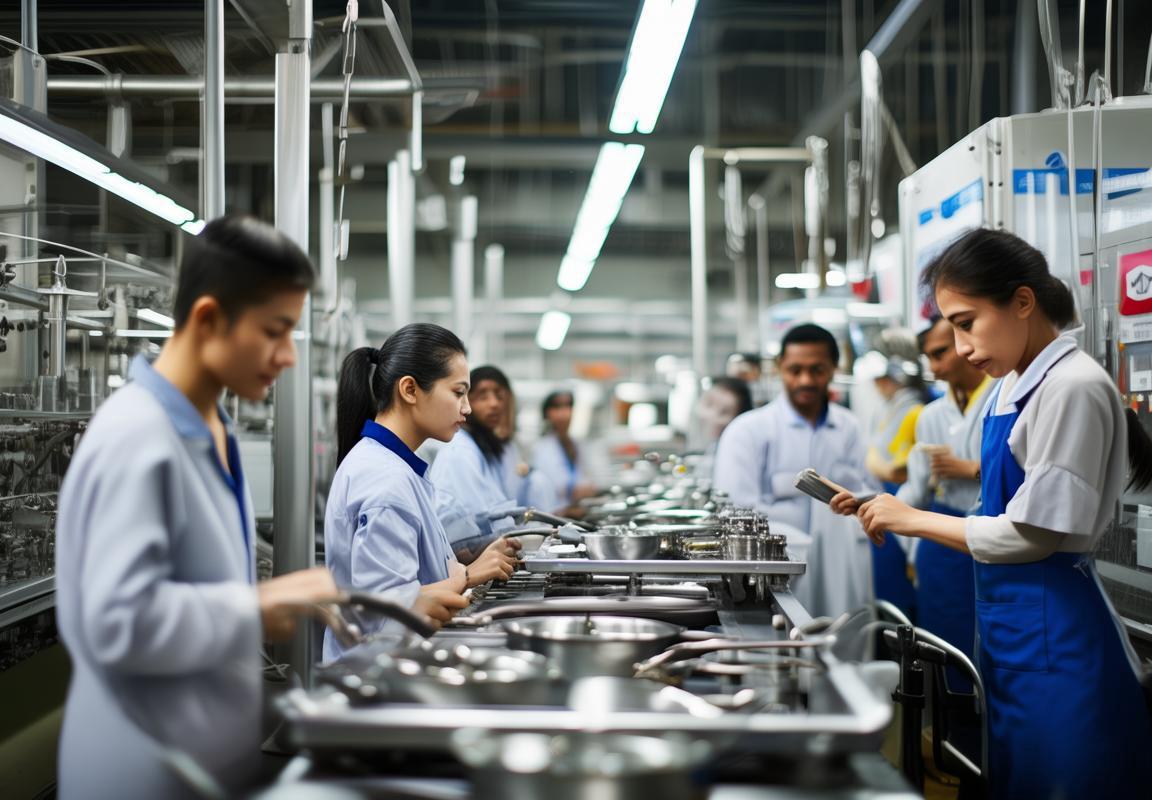
The Significance of Kitchenware Production
Kitchenware production holds a pivotal role in the daily lives of people around the world, serving as the backbone of culinary experiences and household routines. The significance of this industry cannot be overstated, as it encompasses a wide array of products that are essential for cooking, dining, and food storage. Let’s delve into the various aspects that make kitchenware production so crucial.
The first aspect to consider is the sheer variety of kitchenware items available. From pots and pans to cutting boards and dishware, the market offers an extensive range of products designed to cater to different culinary needs. Each item plays a unique role in the preparation and presentation of food, ensuring that meals are not only delicious but also visually appealing.
Moreover, kitchenware is instrumental in enhancing the cooking process. High-quality cookware, such as non-stick pans and stainless steel pots, can greatly improve the efficiency and ease of cooking. These products are designed to distribute heat evenly, reducing the risk of food sticking or burning. In turn, this allows for more precise control over cooking temperatures, which is essential for achieving the perfect texture and flavor in various dishes.
The importance of kitchenware extends beyond the kitchen itself. Many kitchenware items are portable and durable, making them perfect for outdoor cooking, camping, or even picnics. These versatile products allow individuals to enjoy a meal prepared with the same level of care as one made at home, regardless of their location.
Safety is another critical factor in kitchenware production. With the increasing awareness of health and wellness, consumers are more inclined to use products that are free from harmful substances. Non-toxic, BPA-free materials have become the norm in kitchenware manufacturing, ensuring that families can use their cookware without worrying about the potential health risks.
In terms of sustainability, kitchenware production plays a significant role in promoting eco-friendly practices. Many manufacturers have shifted towards using recycled materials and sustainable resources in their production processes. This not only reduces the environmental impact but also encourages consumers to make more sustainable choices in their daily lives.
The global kitchenware market is also a major contributor to the economy. Countless jobs are supported by the production and distribution of kitchenware, from manufacturing and design to sales and marketing. This industry provides a vital source of income for numerous individuals and communities worldwide.
Additionally, kitchenware production fosters innovation and creativity. As new technologies and materials emerge, manufacturers are constantly seeking ways to improve their products. This drive for innovation has led to the development of cutting-edge kitchenware that not only enhances the cooking experience but also simplifies daily tasks.
The cultural significance of kitchenware cannot be ignored either. Many kitchenware items are adorned with intricate designs and symbols that reflect the heritage and traditions of specific regions. These items not only serve a practical purpose but also serve as decorative pieces, adding a touch of personality and charm to any kitchen.
Furthermore, kitchenware production contributes to the development of local communities. Many manufacturers source raw materials and employ local workers, which helps to stimulate economic growth and improve living standards. This, in turn, supports the overall well-being of the community.
In conclusion, kitchenware production is a multifaceted industry that touches the lives of people in countless ways. From providing essential tools for cooking and dining to fostering economic growth and cultural exchange, the significance of this industry is undeniable. As consumers continue to seek high-quality, innovative, and sustainable kitchenware products, the importance of this industry will only continue to grow.
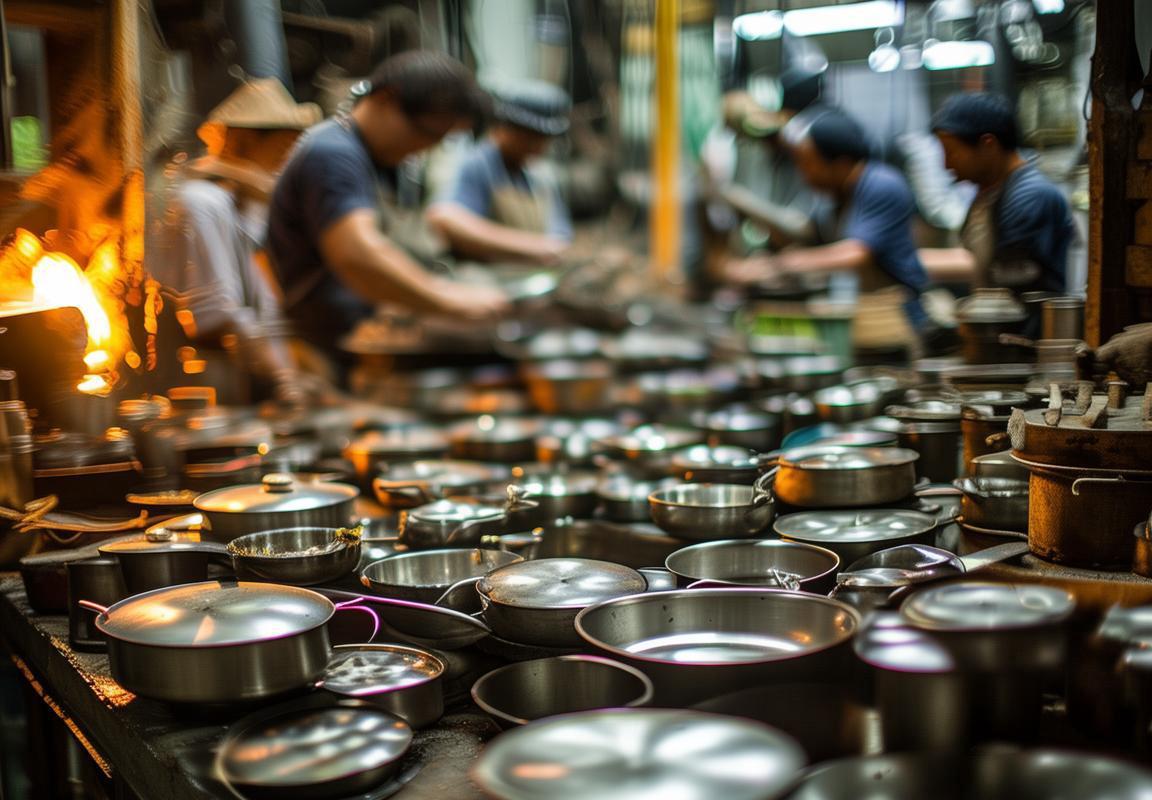
What is BSCI?
BSCI, or the Business Social Compliance Initiative, is a global initiative that aims to improve working conditions across the supply chain. It’s a multi-stakeholder effort that brings together retailers, brands, and manufacturers to ensure that social compliance standards are met. Here’s a closer look at what BSCI entails:
The core of BSCI revolves around a set of standards that are designed to protect workers from exploitation and unsafe working conditions. These standards are based on international labor rights, including the conventions of the International Labour Organization (ILO). They encompass areas such as freedom of association, child labor, forced labor, health and safety, and fair wages.
One of the key aspects of BSCI is the commitment to continuous improvement. Companies that join the initiative are expected to not only meet the current standards but also work towards enhancing their social compliance practices over time. This commitment is reflected in the BSCI Code of Conduct, which outlines the principles and practices that members must adhere to.
BSCI operates on a principle of shared responsibility. This means that while the ultimate accountability for social compliance rests with the brand and retailer, all participants in the supply chain—manufacturers, suppliers, and sub-suppliers—are expected to contribute to the implementation of the initiative’s standards.
The BSCI Audit System is a critical component of the initiative. It involves a comprehensive assessment process that includes both on-site inspections and desk audits. These audits are conducted by independent third-party auditors who review the compliance of factories with the BSCI standards. The results of these audits are then used to provide a clear picture of a factory’s performance in areas such as labor rights, working conditions, and environmental practices.
One of the hallmarks of BSCI is its focus on capacity building. This means that in addition to ensuring compliance, the initiative also works to improve the capacity of suppliers to meet the standards. This can involve providing training on labor rights, health and safety, and environmental sustainability, as well as offering support in areas such as management systems and governance.
The BSCI database is another important aspect of the initiative. It serves as a central repository for information on audits and corrective actions taken by members. This database is accessible to all BSCI participants, allowing for transparency and collaboration. It also enables members to verify the compliance of their supply chain partners and to make informed decisions about their sourcing practices.
The initiative is not just about enforcing compliance; it’s also about fostering a culture of ethical business practices. BSCI encourages members to engage with workers and local communities, to promote dialogue, and to address concerns that may arise. This approach helps to build trust and respect within the supply chain.
One of the challenges of BSCI is the complexity of the global supply chain. With goods often passing through multiple hands before reaching the end consumer, ensuring that every link in the chain adheres to BSCI standards can be daunting. However, the initiative recognizes this complexity and works to provide guidance and support to all stakeholders.
BSCI is also adaptable to different regions and cultures. The initiative understands that local laws and customs can vary greatly, and it aims to tailor its approach to fit the context of each supply chain. This flexibility allows BSCI to remain relevant and effective across diverse markets.
Furthermore, BSCI places a strong emphasis on the rights of vulnerable groups within the workforce. This includes women, children, and indigenous peoples, who are often more susceptible to exploitation. The initiative works to protect these groups by ensuring that their specific needs and rights are recognized and addressed.
In conclusion, BSCI is a multifaceted initiative that addresses a wide range of social compliance issues within the supply chain. By promoting ethical practices, fostering collaboration, and providing support for continuous improvement, BSCI plays a crucial role in creating a more just and sustainable global economy. Whether you’re a manufacturer, a retailer, or an end consumer, understanding the principles and objectives of BSCI is an important step towards ensuring that the products we buy are made with respect for human rights and in safe working conditions.

The BSCI Audit Process in Kitchenware Factories
The BSCI audit process is a meticulous and comprehensive assessment designed to ensure that factories adhere to specific ethical and social compliance standards. This process involves several key steps that are crucial in certifying the integrity of kitchenware manufacturing facilities.
In-Depth Analysis of Labor Conditions
The audit begins with a thorough examination of labor conditions. This includes evaluating the hiring process, ensuring that workers are employed legally and are not subjected to child labor or forced labor. The auditors look into the minimum age for employment, the legality of working hours, and the payment of wages in accordance with local laws and regulations. They also assess whether overtime is properly compensated and whether there are mechanisms in place to prevent excessive workloads.
Health and Safety Assessments
Health and safety standards are critical in the kitchenware industry, where machinery and sharp tools are common. The audit process delves into the factory’s health and safety protocols, ensuring that protective equipment is provided, training is conducted, and that there are clear emergency procedures in place. The auditors check the maintenance of safety equipment, the cleanliness of the workspace, and the overall well-being of employees.
Environmental Management and Sustainability
The BSCI audit process also encompasses environmental considerations. Factories must demonstrate a commitment to sustainable practices, such as reducing waste, managing emissions, and conserving natural resources. Auditors review the factory’s environmental policies, the use of hazardous materials, and the disposal of waste. They also assess whether the factory has any programs in place to mitigate its environmental impact.
Business Ethics and Corruption Prevention
Ethical business practices are a cornerstone of the BSCI audit. Auditors scrutinize the factory’s approach to anti-corruption, ensuring there are policies to prevent bribery and unfair business practices. This includes evaluating the transparency of the factory’s operations, the handling of conflicts of interest, and the establishment of a whistleblowing system for employees to report unethical behavior.
Child Labor and Human Rights
One of the most crucial aspects of the BSCI audit is the prevention of child labor. Auditors investigate the factory’s policies and practices to ensure that no child workers are employed, and that there are systems in place to detect and prevent such practices. They also assess the protection of human rights, including the freedom of association and the right to collective bargaining.
Suppliers and Subcontractors
The audit process extends beyond the factory walls to include suppliers and subcontractors. BSCI auditors verify that all entities within the supply chain comply with the same standards. This means assessing the social compliance of suppliers and ensuring that the same principles of ethical manufacturing are upheld at every level.
Audit Methodology and Training
The auditors use a structured methodology to conduct their evaluations. This involves site visits, interviews with workers and management, document reviews, and sometimes even physical observations of the factory environment. The auditors are trained professionals who understand the nuances of the kitchenware industry and the specific challenges it presents.
Feedback and Corrective Actions
Once the audit is complete, the factory receives a detailed report outlining the findings. This report includes areas of non-compliance and suggestions for improvement. Factories are given a specific timeframe to address any identified issues and to implement corrective actions. Auditors may conduct follow-up visits to ensure that the necessary changes have been made.
Continuous Improvement and Certification
The BSCI audit is not a one-time event; it’s part of a continuous improvement process. Factories must demonstrate ongoing compliance to maintain their BSCI certification. This includes regular self-assessments, audits, and the implementation of a management system to ensure that social compliance remains a priority.
The BSCI audit process in kitchenware factories is a robust and multifaceted approach to ensuring that ethical standards are met. It not only protects workers and the environment but also enhances the reputation and credibility of the factories that undergo this rigorous assessment.
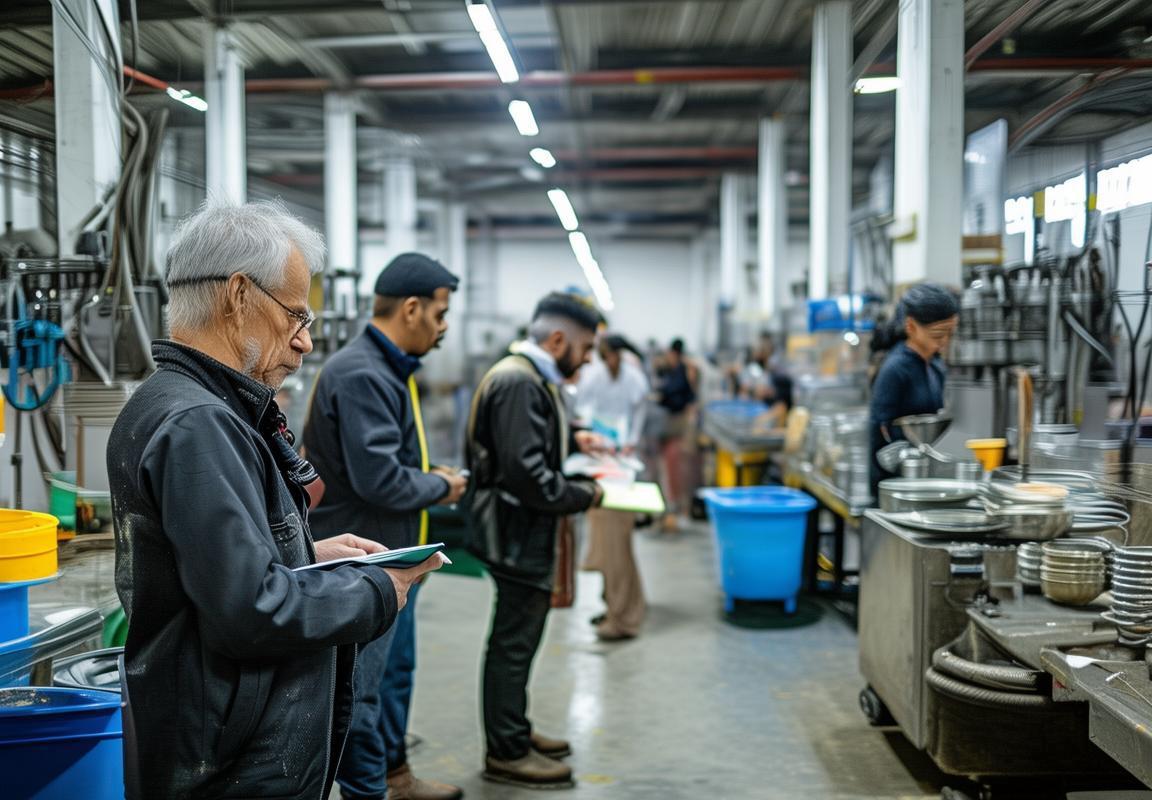
Benefits of BSCI Certification for Kitchenware Manufacturers
BSCI certification can offer numerous advantages to kitchenware manufacturers, enhancing their reputation, operations, and marketability. Here’s an in-depth look at some of the key benefits:
Manufacturers often strive to ensure that their products meet the highest standards of quality and safety. With BSCI certification, they achieve this by adhering to a stringent code of conduct. This certification serves as a stamp of approval, guaranteeing that the manufacturing process is free from child labor, forced labor, discrimination, and other unethical practices.
Enhanced Consumer TrustIn an era where consumers are more conscious about where their products come from, BSCI certification builds trust. Consumers are increasingly looking for ethically produced goods, and a BSCI-certified kitchenware manufacturer can use this certification as a selling point. This trust can lead to increased customer loyalty and a competitive edge over non-certified brands.
Global Market AccessThe BSCI standard is recognized across the globe, which means kitchenware manufacturers can easily access international markets. Retailers and distributors often require their suppliers to be BSCI certified, making it a prerequisite for doing business with many large retailers. This certification can open doors to partnerships with major global brands.
Improved Supply Chain ManagementThe BSCI audit process involves a thorough assessment of a manufacturer’s entire supply chain. This examination helps identify areas for improvement and ensures that all stages of production are transparent and compliant with the code of conduct. By addressing these issues, kitchenware manufacturers can enhance the efficiency and sustainability of their supply chain operations.
Cost SavingsWhile obtaining BSCI certification may require an initial investment in audits and improvements, the long-term benefits can lead to cost savings. By streamlining operations, reducing waste, and improving efficiency, manufacturers can lower production costs. Additionally, avoiding fines and legal disputes related to unethical practices can save substantial amounts of money in the long run.
Increased ProductivityThe audit process often reveals opportunities for increasing productivity. By identifying bottlenecks and inefficiencies in the production process, kitchenware manufacturers can implement changes that lead to more streamlined operations. This not only boosts output but also allows for quicker response times to customer orders.
Risk MitigationThe BSCI audit is comprehensive, covering a wide range of social, environmental, and ethical risks. By addressing these risks proactively, manufacturers can mitigate potential legal and reputational damage. This includes safeguarding workers’ rights, ensuring safe working conditions, and minimizing environmental impact.
Brand DifferentiationIn a crowded marketplace, BSCI certification can help kitchenware manufacturers differentiate their brand. Ethical and sustainable practices are becoming more important to consumers, and being BSCI-certified can set a manufacturer apart from competitors who have not taken similar steps. This differentiation can be a powerful marketing tool, attracting customers who are committed to ethical shopping.
Improved Worker Well-beingBSCI certification is designed to improve the lives of workers. By ensuring fair wages, decent working hours, and access to medical care, manufacturers contribute to a healthier and happier workforce. A satisfied and well-taken-care-of workforce is more likely to be productive and loyal, leading to a more stable and reliable operation.
Long-term Strategic AdvantageThe benefits of BSCI certification extend beyond immediate gains. By integrating ethical practices into their core operations, kitchenware manufacturers position themselves for long-term success. As consumer expectations evolve and the market demands greater transparency and accountability, being BSCI-certified can be a significant strategic advantage.
In summary, BSCI certification for kitchenware manufacturers offers a multitude of benefits, from enhanced consumer trust and improved market access to better supply chain management and cost savings. By committing to the BSCI code of conduct, manufacturers not only contribute to the betterment of workers’ lives but also secure their place as responsible and sustainable players in the global market.

Ensuring Quality and Safety in Kitchenware Production
Navigating the complexities of kitchenware production, ensuring both quality and safety is paramount. From the raw materials to the finished product, every step must be meticulously managed. Here’s an intricate look at the processes involved:
Manufacturers must rigorously inspect the source of their materials to guarantee the quality of their kitchenware products. This involves checking for compliance with health and safety standards, as well as environmental regulations. For instance, metals used in cookware must be free of harmful contaminants, and plastics must meet specific temperature and durability requirements.
Quality control systems are put in place to oversee the manufacturing process from start to finish. These systems often include regular audits, where products are sampled and tested for adherence to specifications. Techniques such as statistical process control (SPC) help to identify and address issues before they become widespread, ensuring consistency in product quality.
In the realm of safety, manufacturers must prioritize the protection of consumers. This means adhering to safety standards that prevent the risk of injury or illness. For example, handles on kitchen utensils must be securely attached and non-slip, and glassware must be shatter-resistant. Regular testing for lead and cadmium, which can leach into food, is also crucial.
Safety training is another critical aspect. Employees must be educated on the proper handling of equipment and materials to minimize accidents. This includes understanding the potential hazards of chemicals used in cleaning and the importance of personal protective equipment (PPE).
To maintain high safety standards, kitchenware factories often employ certified professionals who specialize in safety and health management. These experts can develop comprehensive safety plans and ensure that all employees are aware of and comply with these plans.
In the realm of environmental sustainability, kitchenware production must also consider the impact on the planet. This involves sourcing materials that are sustainably harvested and reducing waste throughout the production process. Energy-efficient manufacturing practices and water conservation measures are also integral to responsible production.
Regular inspections and audits by independent third parties help to verify compliance with quality and safety standards. These audits can be conducted by organizations like the British Standards Institution (BSI) or the International Organization for Standardization (ISO). They assess everything from the factory’s internal processes to the end product’s performance.
Quality and safety in kitchenware production also entail transparency with customers. Manufacturers often provide detailed product specifications and certifications to assure buyers that their products meet the highest standards. This can include certifications for specific materials, such as stainless steel or porcelain, which are known for their durability and safety.
Moreover, kitchenware manufacturers must stay informed about evolving regulations and standards. This means continuously updating their processes and technologies to meet new requirements. Adapting to advancements in materials science, for example, can lead to the development of new products that are safer and more innovative.
In summary, ensuring quality and safety in kitchenware production is a multifaceted endeavor. It encompasses meticulous material sourcing, robust quality control measures, comprehensive safety training, environmental sustainability initiatives, third-party audits, transparency with consumers, and a commitment to ongoing improvement. By focusing on these aspects, manufacturers can build trust with their customers and maintain a competitive edge in the market.
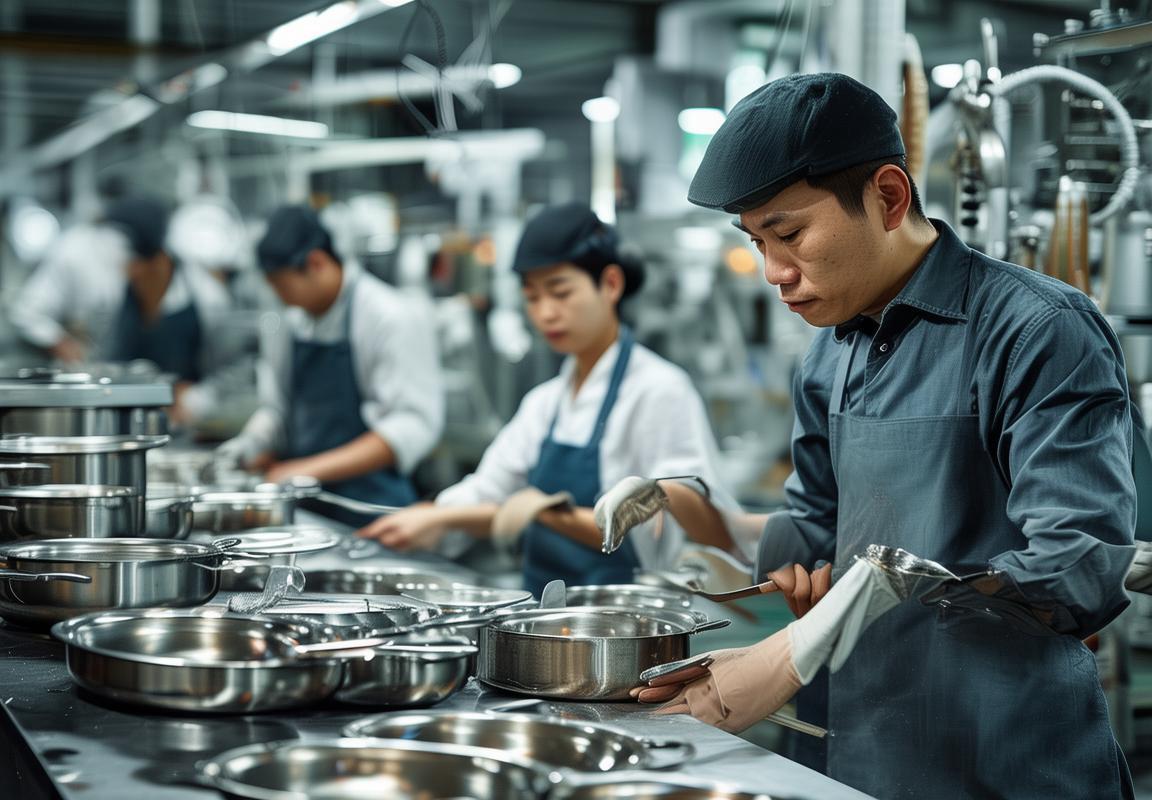
Case Study: A BSCI-Audited Kitchenware Factory
In a bustling industrial area on the outskirts of Guangzhou, there lies a factory that stands as a testament to the rigorous standards of the Business Social Compliance Initiative (BSCI). This kitchenware factory, known for its sleek designs and high-quality products, has earned its stripes through a thorough BSCI audit. Let’s delve into the specifics of this case study.
The factory, which spans over 50,000 square meters, is a hub of activity from early morning until late at night. Workers, diverse in their origins, are seen meticulously crafting a range of kitchenware products, from stainless steel utensils to glassware. The BSCI audit process has not only shaped the factory’s operations but has also elevated its status within the global market.
One of the key aspects of the BSCI audit is the assessment of working conditions. The factory prides itself on providing a safe and healthy environment for its employees. Each worker is equipped with the necessary safety gear, and the factory has implemented regular health checks to ensure that the workforce remains in good physical condition. The audit also verifies that the factory adheres to local labor laws, offering fair wages and benefits, and respects the rights of its employees.
The audit process extends to the supply chain, where the factory sources raw materials from various suppliers. The BSCI standards require that these suppliers also meet the same criteria for ethical labor practices, environmental protection, and product safety. This means that every piece of metal, glass, or plastic used in the manufacturing process is traceable back to a source that complies with BSCI’s stringent requirements.
Quality control is another cornerstone of the factory’s operations. Every product undergoes a series of inspections before it leaves the factory floor. These checks are not just superficial; they delve into the materials used, the craftsmanship, and the durability of the kitchenware. The BSCI audit has enforced a zero-tolerance policy for defects, ensuring that only the highest quality items reach the end consumer.
The factory’s commitment to sustainability is evident in its energy-efficient practices. Solar panels cover the roof, and the manufacturing process minimizes waste and emissions. The BSCI audit has pushed the factory to innovate and improve its environmental footprint, making it a model of eco-friendly production within the kitchenware industry.
The management team at the factory understands the importance of continuous improvement. They engage in regular training sessions for employees to ensure that everyone is up-to-date with the latest health and safety protocols. The BSCI audit has also led to the development of a robust feedback system, allowing workers to voice their concerns and suggestions directly to management.
In the realm of product safety, the factory has invested in state-of-the-art testing equipment. Products are tested for lead, cadmium, and other harmful substances, well beyond the legal requirements. This dedication to safety means that the kitchenware products are not just beautiful and functional, but also safe for use in homes around the world.
The factory’s reputation has grown significantly since the BSCI audit was first implemented. Customers, both large retailers and individual consumers, are increasingly seeking out BSCI-certified products, knowing that they are supporting ethical manufacturing practices. This has opened up new markets and opportunities for the factory, allowing it to expand its product line and explore new designs.
Internationally, the factory has become a beacon of quality and social responsibility. The BSCI audit has not only helped to prevent the sale of substandard products but has also raised the bar for all kitchenware manufacturers. It has set a precedent for what is expected in terms of ethical business conduct and product safety.
In the world of kitchenware production, the BSCI audit is a mark of distinction. The factory in Guangzhou stands as a shining example of how adherence to these standards can transform a business, not just for the sake of compliance, but for the betterment of the entire supply chain and the consumers who rely on these products every day.
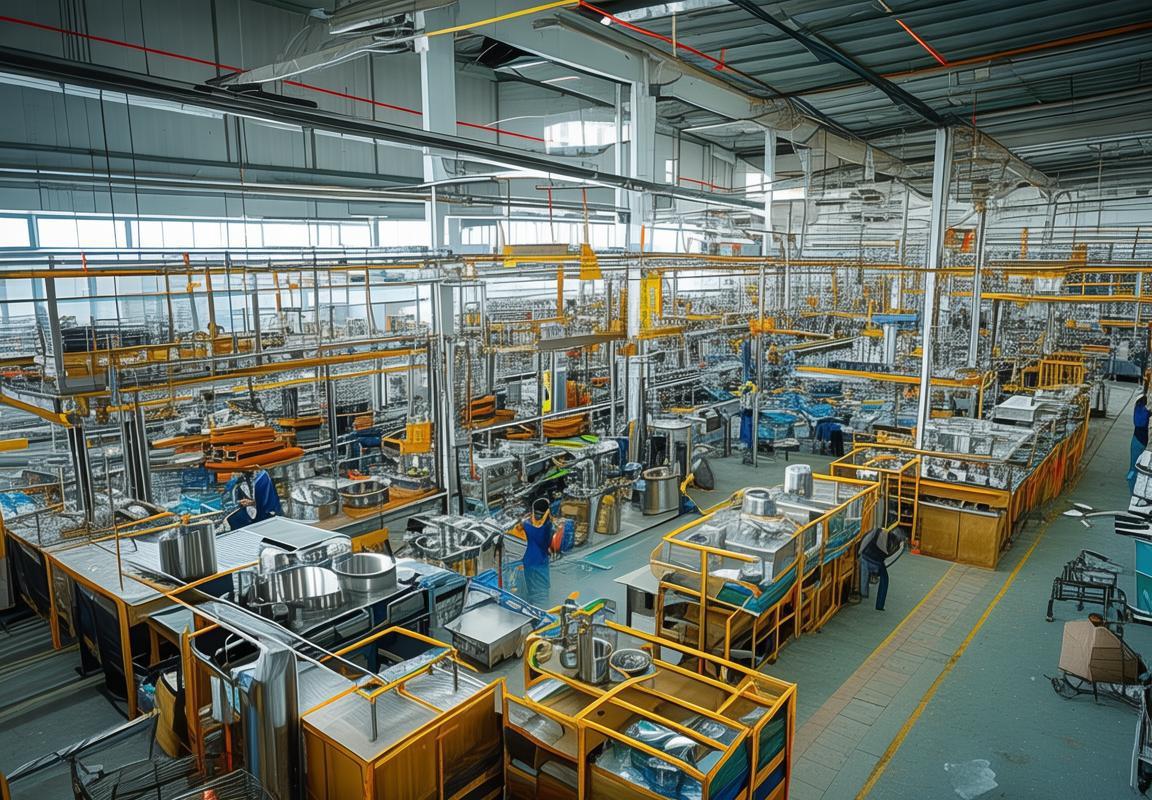
The Role of BSCI in the Global Kitchenware Market
In the ever-evolving landscape of the global kitchenware market, the BSCI (Business Social Compliance Initiative) plays a pivotal role in shaping standards and ensuring ethical practices. BSCI is not just a certification; it’s a commitment to social accountability and transparency. Its influence on the kitchenware market can be seen in several key aspects.
The first is the standardization of labor practices. Kitchenware factories, whether small-scale or large, must adhere to BSCI’s guidelines on fair wages, working hours, and child labor laws. This standardization ensures that the production of kitchenware isn’t at the expense of human rights, fostering a more sustainable and ethical market.
Secondly, BSCI’s impact is felt through the promotion of safe working conditions. In the bustling environment of a kitchenware factory, safety is paramount. BSCI audits often include assessments of health and safety measures, such as the availability of protective equipment, the maintenance of machinery, and the implementation of emergency procedures. This focus on safety not only protects the workers but also enhances the reputation of kitchenware brands that partner with BSCI-compliant factories.
The third aspect is the emphasis on environmental responsibility. Kitchenware production, like any manufacturing process, can have a significant environmental footprint. BSCI encourages factories to minimize waste, reduce energy consumption, and use sustainable materials. This shift towards eco-friendly practices has become a crucial factor for consumers who are increasingly conscious of their ecological impact.
In the realm of product quality, BSCI certification acts as a seal of approval. It ensures that kitchenware products meet specific standards in terms of durability, functionality, and safety. This quality assurance is especially important in the kitchenware market, where products are used daily and can have a direct impact on consumers’ health and well-being.
One cannot overlook the role of BSCI in fostering trust between manufacturers and consumers. As consumers become more discerning, they seek out brands that are transparent about their supply chain practices. BSCI certification provides a level of assurance that the kitchenware they purchase is not only of high quality but also produced in a manner that respects human rights and the environment.
The global kitchenware market is diverse, spanning from high-end, designer brands to mass-market products. BSCI certification serves as a bridge between these different segments, offering a common language and set of expectations. It allows smaller manufacturers to compete on a global scale by meeting the same standards as larger, more established brands.
Moreover, BSCI’s role in the market is not just about compliance; it’s also about continuous improvement. Factories are required to undergo regular audits to ensure that they are maintaining the high standards set by BSCI. This ongoing process encourages innovation and drives the industry towards more sustainable and ethical practices.
Another significant impact of BSCI in the kitchenware market is the reduction of labor disputes and conflicts. By promoting fair labor practices, BSCI helps to create a more harmonious work environment, which in turn reduces the risk of strikes and other labor issues that can disrupt production and harm a company’s reputation.
The global kitchenware market is also subject to various regulations and certifications, many of which overlap with BSCI’s standards. This overlap makes BSCI a versatile tool for manufacturers looking to meet multiple compliance requirements with a single certification process. This versatility is particularly valuable in the international market, where different countries have different regulations and standards.
Lastly, BSCI’s influence extends beyond the kitchenware market itself. It has the power to influence the broader manufacturing industry, encouraging other sectors to adopt similar social compliance initiatives. This ripple effect can lead to a more ethical and sustainable global supply chain.
In conclusion, BSCI’s role in the global kitchenware market is multifaceted, touching on labor practices, safety standards, environmental responsibility, product quality, consumer trust, and the overall health of the industry. By setting and enforcing high ethical standards, BSCI continues to shape the market and inspire change, ensuring that kitchenware production is not just a business, but a responsible one.

Challenges and Solutions in BSCI Compliance
Navigating the complexities of the Business Social Compliance Initiative (BSCI) compliance process can be daunting for kitchenware manufacturers. Here’s a look at some of the challenges they face and potential solutions to overcome them.
Understanding the Scope of BSCI StandardsManufacturers often struggle to fully grasp the extensive scope of BSCI standards. These standards encompass labor rights, health and safety, working conditions, and environmental practices. To tackle this challenge, companies can invest in comprehensive training programs for their staff, ensuring everyone is well-versed in the BSCI guidelines and how they apply to their specific operations.
Overcoming Cultural and Language BarriersInternational kitchenware manufacturers may encounter cultural and language differences that complicate the compliance process. Miscommunication can lead to misunderstandings and delays. Solutions include hiring multilingual staff, utilizing translation services, and fostering a culture of open communication where employees feel comfortable raising concerns.
Resource Allocation and BudgetingCompliance with BSCI standards requires a significant investment in resources and time. Budgeting for these efforts can be challenging, especially for smaller manufacturers. Streamlining operations and seeking funding opportunities, such as grants or subsidies aimed at improving social compliance, can help offset the costs.
Managing Supply Chain ComplexityKitchenware production often involves a complex supply chain with multiple suppliers and sub-contractors. Ensuring that all parties adhere to BSCI standards is a logistical nightmare. One solution is to establish clear communication channels and regular audits to monitor compliance throughout the supply chain.
Addressing Health and Safety ConcernsEnsuring the health and safety of workers is a cornerstone of BSCI. Manufacturers may face challenges in identifying and mitigating risks in their factories. Investing in proper safety equipment, conducting regular risk assessments, and providing ongoing training can help create a safer work environment.
Navigating Regulatory ChangesRegulatory environments are constantly evolving, and staying abreast of changes can be difficult. Manufacturers need to stay informed about local laws and international standards to maintain BSCI compliance. Regularly reviewing legal updates and consulting with compliance experts can help keep the company on track.
Dealing with Worker IssuesWorker rights are at the heart of BSCI. Issues such as fair wages, working hours, and the right to unionize can be contentious. Companies need to foster a culture of respect and transparency. Implementing fair labor practices, providing channels for worker feedback, and addressing grievances promptly are crucial steps.
Managing Audits and Corrective ActionsBSCI audits can be rigorous, and non-compliance can lead to corrective actions. Manufacturers must be prepared for audits and be ready to implement changes quickly. Developing a robust corrective action plan, maintaining detailed records, and ensuring follow-up actions are taken can help navigate this process effectively.
Balancing Quality and ComplianceBalancing the need for high-quality kitchenware with compliance to BSCI standards can be a tightrope walk. Companies must ensure that their products meet both quality and ethical standards. Investing in quality control measures and integrating compliance into the production process can help achieve this balance.
Training and DevelopmentInvesting in the training and development of employees is not only a BSCI requirement but also a long-term strategy for success. By equipping workers with the skills and knowledge to perform their jobs safely and efficiently, manufacturers can improve productivity and reduce the risk of non-compliance.
In conclusion, the challenges in BSCI compliance for kitchenware manufacturers are multifaceted. By addressing these challenges head-on with a combination of training, communication, resource management, and a commitment to ethical practices, companies can not only meet the standards but also improve their overall business operations.

Conclusion: Why BSCI Audited Kitchenware Matters
In the ever-evolving landscape of global trade, the importance of adherence to ethical standards cannot be overstated. BSCI-audited kitchenware, in particular, stands as a beacon of quality and responsibility. The process of obtaining BSCI certification, the challenges faced, and the solutions implemented are all part of a larger narrative that underscores the significance of BSCI audited kitchenware in today’s market.
The market for kitchenware is vast and diverse, with consumers seeking products that not only serve their practical needs but also align with their values. BSCI audited kitchenware ensures that these products are not just well-made but also produced under conditions that respect human rights and labor standards. This certification process is rigorous and comprehensive, and its impact on the kitchenware market is profound.
For manufacturers, BSCI certification offers a competitive edge. It signals to customers that their products are not just of high quality but also come with a social responsibility. This can lead to increased trust and loyalty, as consumers are more likely to choose brands that align with their ethical beliefs. Moreover, BSCI certification can open doors to new markets, particularly those with stringent regulations regarding labor and human rights.
One of the key benefits of BSCI certification is the assurance it provides to consumers. When they purchase BSCI-audited kitchenware, they can be confident that the product was produced in a factory that adheres to fair labor practices, safe working conditions, and environmental sustainability. This peace of mind is invaluable in an age where transparency is increasingly important.
The BSCI audit process itself is meticulous. It involves an assessment of a factory’s compliance with BSCI’s Code of Conduct, which covers areas such as working conditions, human rights, health and safety, and environmental practices. Auditors examine the factory’s policies, procedures, and actual practices to ensure they align with the standards set by BSCI.
The audit process is not just about checking boxes; it’s about fostering a culture of continuous improvement. Factories that undergo the BSCI audit are encouraged to identify areas where they can make improvements and are provided with support to do so. This can lead to better working conditions, reduced waste, and more sustainable operations.
However, the path to BSCI compliance is not without its challenges. Many manufacturers face the difficulty of balancing ethical standards with the demands of a competitive market. They may find that implementing changes to meet BSCI standards requires significant investment in training, infrastructure, and technology. Moreover, the audit process itself can be time-consuming and resource-intensive.
Despite these challenges, there are numerous solutions that manufacturers can adopt. Investing in employee training programs can help ensure that workers are aware of their rights and understand the importance of ethical production. Implementing efficient waste management systems can reduce environmental impact, while investing in sustainable materials can appeal to environmentally conscious consumers.
Collaboration with NGOs and local communities can also be beneficial. These partnerships can provide valuable insights and support in improving working conditions and addressing social issues. By working together, manufacturers can create a more sustainable and ethical supply chain.
In the global kitchenware market, BSCI plays a crucial role in setting the standard for ethical production. It serves as a benchmark for companies looking to differentiate themselves in a crowded marketplace. By adhering to BSCI’s Code of Conduct, kitchenware manufacturers demonstrate their commitment to social responsibility, which is increasingly important to consumers around the world.
The global kitchenware market is dynamic, with trends shifting towards products that are not only functional but also sustainable and ethically produced. BSCI certification is a key factor in this shift, as it provides a reliable indicator of a product’s ethical credentials. For manufacturers, this means that investing in BSCI compliance can lead to long-term benefits, including improved brand reputation and access to new markets.
Challenges in BSCI compliance are real, but they are not insurmountable. With the right strategies and a commitment to ethical practices, manufacturers can navigate these challenges and emerge stronger. The solutions lie in a combination of education, technology, and collaboration, all of which can lead to more sustainable and responsible kitchenware production.
In conclusion, BSCI audited kitchenware matters because it represents a commitment to quality, safety, and social responsibility. It is a testament to the manufacturer’s dedication to producing products that not only meet the highest standards of craftsmanship but also do so in a manner that respects the people and planet. As the global kitchenware market continues to evolve, the importance of BSCI certification will only grow, ensuring that consumers have access to products that are not just beautiful and functional but also ethically produced.